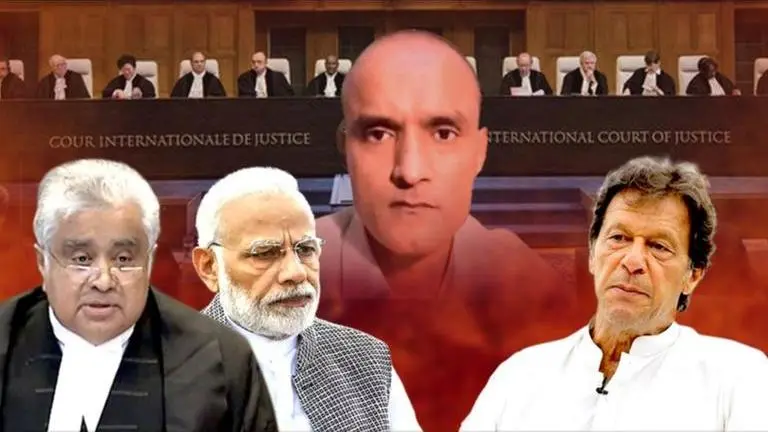Updated 17 July 2019 at 15:53 IST
Kulbhushan Jadhav Case: Here are India's arguments against Pakistan's sham, ahead of ICJ's big verdict
As India faces off Pakistan on an international stage at the International Court of Justice regarding the Kulbhushan Jadhav case, here are the key arguments supporting India's stance held by the country in the court, which will give its final verdict on Wednesday evening at 6:30 PM
- India News
- 4 min read

As India faces off Pakistan on an international stage at the International Court of Justice regarding the Kulbhushan Jadhav case, here are the key arguments supporting India's stance held by the country in the court, which will give its final verdict on Wednesday evening at 6:30 PM, at the Peace Palace in The Hague, Netherlands. Judge Abdulqawi Ahmed Yusuf, President of the Court, will read out the verdict.
1. Pakistan's violation of international treaties:
India has argued that Jadhav's arrest on 3 March 2016 violated two international treaties - The Vienna Convention on Consular Relations and the International Covenant on Civil and Political Rights by failing to inform India of the arrest immediately, declining consular access to Jadhav.
2. The farcical nature of Pakistani military courts:
India has also stated that the use of military courts to try a civilian like Kulbhushan Jadhav violated process. It further states that Military Courts were set up after 2015 to engage in summary trials. India has further argued that Jadhav's 'confessions' were taken in captivity, without adequate legal representation.
3. Usage of the Jadhav case to blame India for Pak's Balochistan issue:
Along the Iran-Pakistan border in the Balochistan area, terror groups such as Jaish al Adl sponsored by Pakistan wreak havoc on Iran. Recently, the US State Department designated Jaish al Adl is a front of Jundullah, which is a Specially Designated Global Terror group. Pakistan has been blaming India as Jadhav - a civilian, was kidnapped by Pakistan from that area.
Advertisement
4. ICJ's interference curbed Pakistan:
By approaching the ICJ, India has stopped Pakistan executing Jadhav. This led to Pakistan arguing that the International Court of Justice had no jurisdiction, which was overruled by the ICJ. Due to which India believes that Pakistan's military has been restrained.
Advertisement
TIMELINE OF THE CASE:
March 3, 2016: Kulbhushan Jadhav is arrested.
March 24, 2016: Pakistan claims Jadhav is an Indian spy, India rejects the claim and over the following week, demands consular access, which it did again on several occasions subsequently.
April 10, 2017: A Pakistani Army court sentences Jadhav to death for "for his involvement in espionage and sabotage activities against Pakistan". India warns Islamabad that it is a case of "premeditated murder". The next day, External Affairs Minister Sushma Swaraj made statements in both the Houses of Parliament, asserting that India will go "out of way" to ensure justice to Jadhav who is an "innocent kidnapped Indian". India then demanded from Pakistan a certified copy of the chargesheet as well as the judgement in the death sentence of Jadhav and seeks consular access to him.
May 8, 2017: India instituted proceedings in the ICJ against Pakistan's violation of the Vienna Convention on Consular Relations, 1963. It asked ICJ to issue provisional measures and issuing immediate instructions to Pakistan to not take any action on the sentence awarded to Jadhav till India's request for Provisional Measures was considered.
May 9, 2017: ICJ called upon Pakistan to act in a way over the pending decision on India's request for Provisional Measures
May 15, 2017: ICJ heard India's request for Provisional Measures
May 18, 2017: ICJ unanimously issued abiding order indicating Provisional Measures requested by India seeking measures to prevent the execution of Jadhav until the final judgment of the Court.
September 13, 2017: India filed its first-round written pleadings
December 13, 2017: Pakistan filed its Counter pleadings
December 19, 2017: India sought 3 months to file second reply
January 5, 2018: Pakistan opposed India's request
January 17, 2018: Court accepted India's request and grants three months time each to India and Pakistan to file second round of reply
April 17, 2018: India filed its second reply in the ICJ
July 17, 2018: Pakistan filed its second round of reply
February 18-21, 2019: Final Oral hearings in the case in ICJ
July 17, 2019: Judgement in the case in ICJ
Published By : Suchitra Karthikeyan
Published On: 17 July 2019 at 15:34 IST
